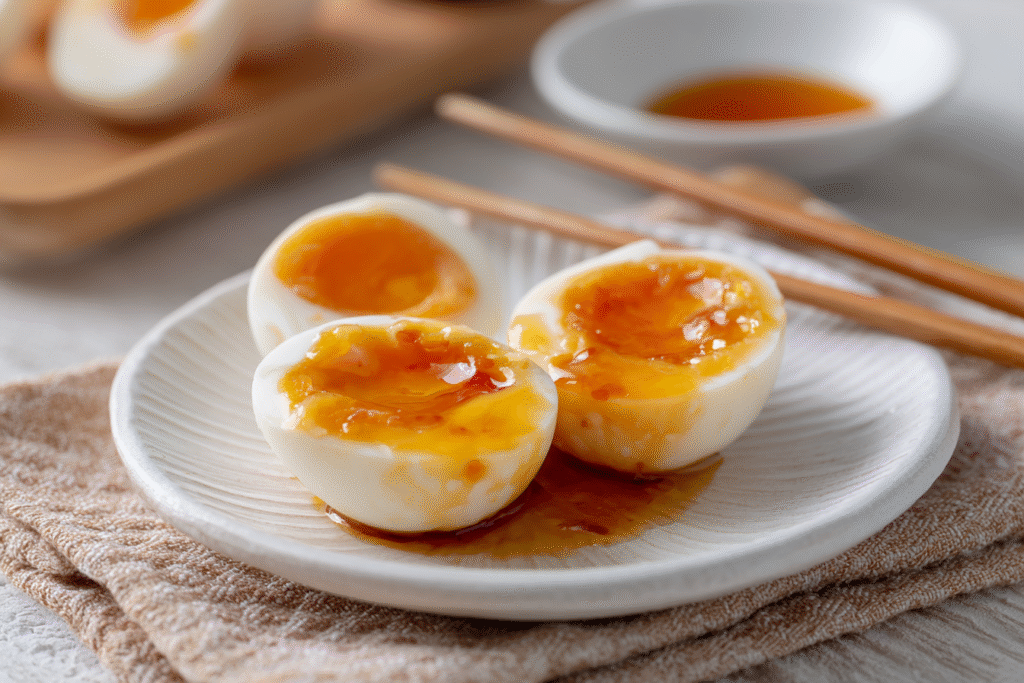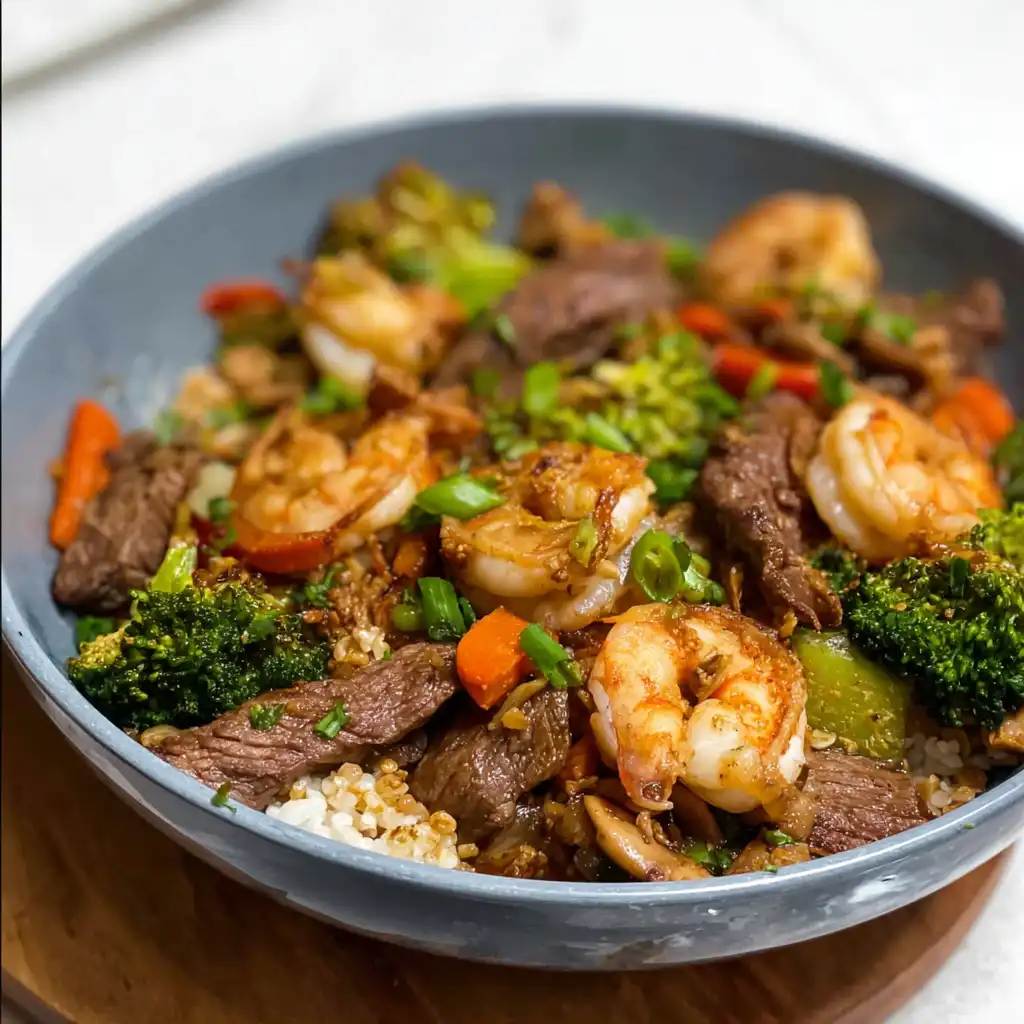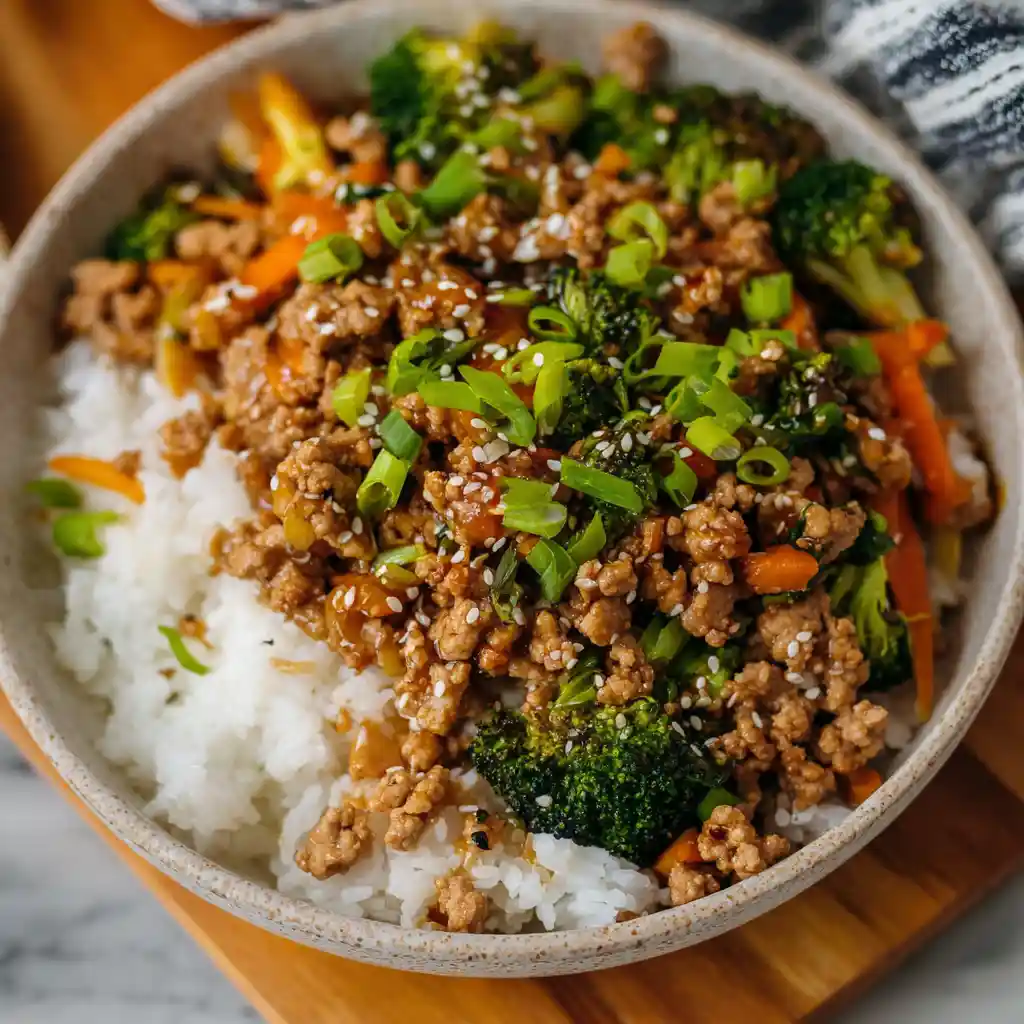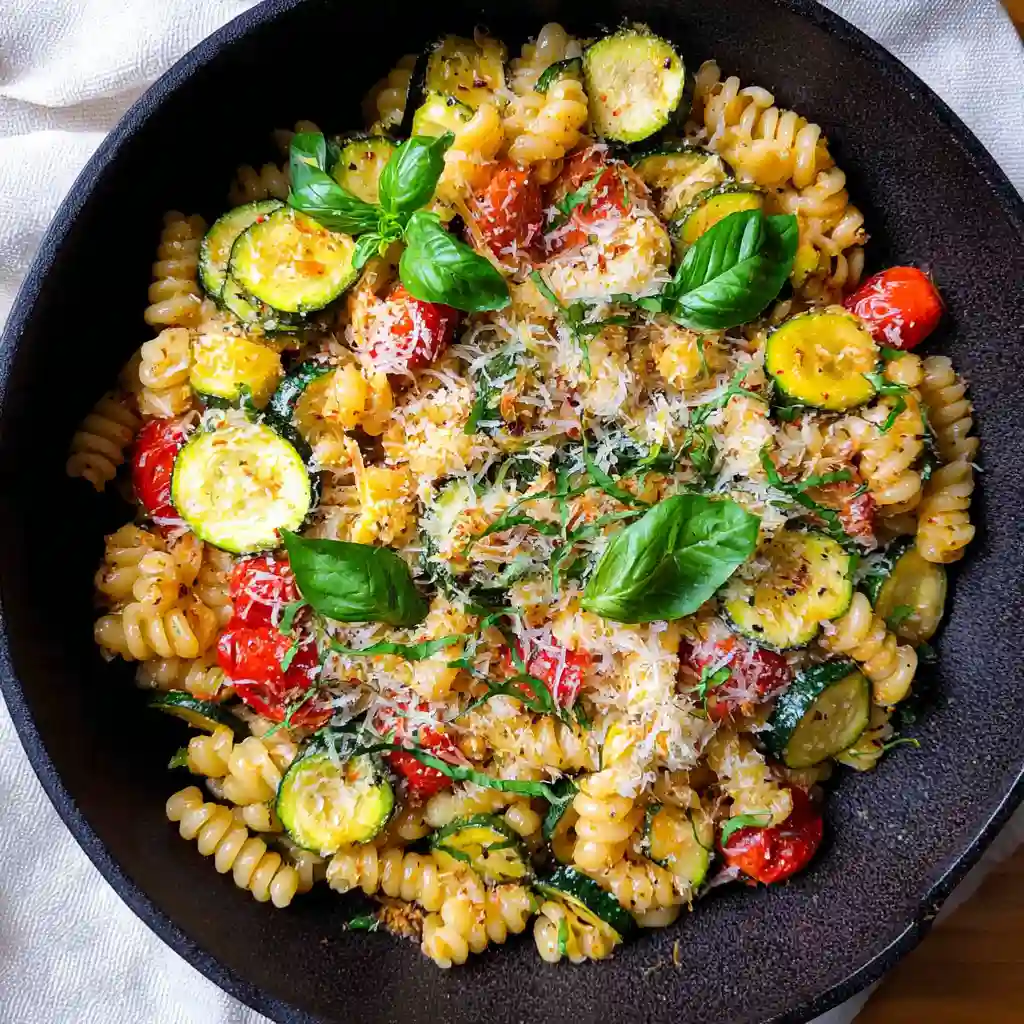Article Introduction
Ramen eggs, or ajitama, are one of those quiet culinary wonders. The kind you don’t realize you’re craving until you bite into that soft, marinated, golden center. These eggs are the soulmates of a good ramen bowl—but they’re just as addictive as a snack or side on their own. With a balance of umami, sweetness, and that perfect jammy yolk, ramen eggs have earned their cult status for a reason. In this guide, you’ll learn exactly how to make ramen eggs at home—no special tools, no tricky techniques. Just a few pantry staples and a little patience.
How Ramen Eggs (Ajitama) Became a Kitchen Obsession
Discovering That First Jammy Bite
The first time I had ramen eggs (ajitama), I didn’t know what they were called. I just knew that in a quiet noodle shop tucked behind a grocery store in my college town, there was this one magical egg—half-submerged in broth, soft and golden in the middle, tasting like soy sauce and mystery. I started going back, again and again, just for that egg. When the shop closed unexpectedly, I realized I needed to figure out how to recreate it at home.
I didn’t grow up with ramen eggs. We didn’t even eat soft-boiled eggs much. So I thought they’d be complicated—some kind of mysterious chef-only trick. Turns out, they’re one of the easiest Japanese dishes to replicate. You don’t need a sushi-grade knife or a special pan. You just need eggs, soy sauce, mirin, sugar, water, and a little time.
Since then, I’ve been making them for everything from weeknight ramen to bento lunches for the kids. And let me tell you—once you’ve got a container of these in the fridge, the temptation to eat one every time you pass by is real.
Why They’re More Than Just a Ramen Topping
The beauty of ramen eggs is that they’re a perfect bite: a creamy, savory-sweet yolk wrapped in a lightly salty white. They’re usually paired with rich ramen broth, but honestly, they deserve the spotlight. You can slice them onto avocado toast, eat them as-is for a high-protein snack, or serve them alongside rice and pickles for a minimalist meal that tastes like way more effort than it is.
What really sets ramen eggs apart is the marinade. Soy sauce brings the salty depth, mirin adds sweetness, and a bit of sugar rounds it all out. The result is an egg that’s flavorful all the way through—but still balanced and never too salty.
Making ramen eggs at home also gives you full control. Want a more savory profile? Use dark soy. Like them sweeter? Up the mirin. Prefer a firm yolk? Boil for longer. It’s the kind of recipe that’s customizable, yet always satisfying.
Mastering the Soft-Boiled Egg for Ramen Eggs (Ajitama)
Timing Is Everything for That Jammy Yolk
If you’ve ever tried to recreate ramen eggs and ended up with hard yolks or undercooked whites, the issue probably wasn’t the ingredients—it was the timing. Ramen eggs (ajitama) are all about precision. Six minutes. That’s the sweet spot for the perfect soft-boiled egg with a slightly runny, jammy yolk and firm, tender whites.
Use eggs straight from the fridge. Don’t bring them to room temperature first. That cold-to-hot contrast helps the whites set up just right. Once the water reaches a rolling boil, lower your eggs in carefully with a spoon. Start your timer the moment they hit the water.
While they cook, prepare an ice bath. This step isn’t optional—it halts the cooking instantly and helps the whites pull away from the shell. When your timer goes off at six minutes, transfer the eggs directly to that ice water. Let them chill for at least 10–15 minutes. The longer they sit, the easier they’ll be to peel.
Pro Tips to Make Peeling Easy
Even when cooked perfectly, peeling soft-boiled eggs can be frustrating. Shells cling, whites tear, yolks leak—it’s a mess. But there are a few tricks that can make all the difference.
First, add a splash of vinegar to your boiling water—about two tablespoons per six cups. This helps loosen the bond between the shell and the egg white. Second, once your eggs are chilled, crack the wider base first and gently peel under running water or while submerged in a bowl. Water gets between the membrane and egg, lifting the shell off more easily.
Third, give yourself time. If you’re planning to serve the eggs the next day, peel them right after the ice bath and let them soak in the marinade overnight. If the eggs are being peeled in a rush, that’s when things go sideways.
Even if the first egg or two don’t come out perfectly, don’t worry—they’ll still taste amazing. And by the third or fourth, you’ll be in a rhythm. There’s something deeply satisfying about peeling a soft egg in one perfect spiral.

Ramen Eggs (Ajitama)
Ingredients
- 6 large egg *see note
- ▢Vinegar optional for boiling eggs
- ▢½ cup soy sauce light sodium
- ▢¼ cup water
- ▢¼ cup mirin
- ▢2 tablespoons granulated sugar
Instructions
- Boil the eggs:
- Bring a pot of water to a boil and gently place the eggs in the boiling water. Let the eggs boil for 6 minutes for the perfect soft boiled eggs.
- *If you wish, add some vinegar to the water. This will make the eggs a bit easier to peel, especial when the eggs are not hard boil eggs. Use 2 tablespoons of vinegar per 5 to 6 cups of water.*
- After 6 minutes, remove the eggs from the boiling water and shock them in ice water. Let the eggs cool completely.
- *This shocking process will help stop the eggs from cooking further and also help to make the eggs easier to peel. We found that soaking the eggs for about 15 minutes or longer is the key to make the eggs much easier to peel. So if you have time, we highly recommend.*
- Make the marinade:
- While the eggs are cooling, make the soy marinade. In the marinating container or a bowl, combine the soy sauce, water, mirin, and sugar. Stir until the sugar has dissolved. If the marinate was made in a bowl, transfer to the container that you’ll be marinating in.
- Marinate the eggs:
- After the cooling process, crack and peel the eggs. Rinse with water if needed to remove any stray egg shells. Place the peeled eggs into the prepared marinade and allow the eggs to soak for at last 8 hours, best overnight.
- *If the eggs are not totally submerged in the marinate, be sure to rotate the eggs occasionally.*
- Enjoy the eggs in ramen, as a side, or as a snack. Leftover ramen eggs should be removed from the marinade after 12 to 36 hours, depending on how seasoned you’d like the eggs.
Notes
6 minute cook time – Our cook time for our eggs are based on large eggs taken out straight from the fridge. This has always given us perfect, soft-boil eggs with runny yolks.
Hard-boiled egg – Although ramen eggs are usually served soft-boiled, you can make these eggs hard-boiled egg by cooking them for 12 minutes instead of 6 minutes. Nutrition Calories: 98.5kcal | Carbohydrates: 5.4g | Protein: 8.3g | Fat: 4.8g | Saturated Fat: 1.6g | Polyunsaturated Fat: 1g | Monounsaturated Fat: 1.8g | Trans Fat: 0.02g | Cholesterol: 186mg | Sodium: 1151mg | Potassium: 110.1mg | Fiber: 0.2g | Sugar: 4.5g | Vitamin A: 270IU | Calcium: 31.9mg | Iron: 1.3mg
The Umami Marinade That Makes Ramen Eggs (Ajitama) Irresistible
Soy, Mirin, Sugar: The Holy Trio
The secret to authentic ramen eggs (ajitama) isn’t complicated. The marinade is made from just four pantry ingredients: soy sauce, mirin, water, and sugar. Combined, they create a deeply savory, slightly sweet, umami-rich bath that transforms plain eggs into a crave-worthy topping or snack.
Let’s break it down:
- Soy sauce provides the base of the flavor. Use light sodium soy sauce if you’re sensitive to salt or plan to marinate the eggs longer than 12 hours.
- Mirin, a sweet Japanese rice wine, balances the saltiness with a touch of sweetness and complexity. If you don’t have it, you can substitute with a mix of white wine and sugar—but true mirin brings the best flavor.
- Water helps mellow the intensity. You don’t want the marinade to overpower the eggs.
- Granulated sugar rounds out the edges and enhances the natural umami of the soy and mirin.
Combine these in a bowl: ½ cup soy sauce, ¼ cup water, ¼ cup mirin, and 2 tablespoons sugar. Stir until the sugar dissolves. You can heat the mixture gently to speed up dissolving, but it’s not necessary.
How Long Should You Marinate Ramen Eggs?
Timing here is just as important as the boiling step. Once your eggs are peeled, gently place them in a container or zip-top bag with the marinade. Make sure they’re submerged as much as possible. If not, rotate them every few hours.
- For light seasoning, marinate for 8–12 hours.
- For deeper color and flavor, marinate up to 24–36 hours.
- Do not exceed 36 hours, or the eggs may become too salty and the whites overly firm.
The fridge is your friend here. Always marinate ramen eggs (ajitama) chilled. And once they’ve hit your ideal level of flavor, remove them from the marinade to prevent over-seasoning.
These eggs keep well for 3–4 days after marinating. They won’t last that long, though—not once you’ve tasted one.

Serving and Storing Ramen Eggs (Ajitama)
How to Serve Ramen Eggs Beyond Ramen
Sure, ramen eggs (ajitama) are made for ramen bowls—but that’s just the beginning. Their savory-sweet flavor and creamy centers make them incredibly versatile across meals.
Try them:
- Sliced in half and placed on top of rice bowls (gyudon, donburi, or even fried rice).
- On toast with avocado and sesame seeds.
- As a snack, straight from the fridge with a pinch of flaky salt.
- In bento boxes, paired with pickled veggies or steamed greens.
- Next to grilled meats, especially teriyaki chicken or beef.
Because ramen eggs are already seasoned, they don’t need much dressing up. A sprinkle of togarashi (Japanese chili pepper) or a drizzle of sesame oil can elevate them further, but even plain, they shine.
For presentation, cut them gently with a sharp, non-serrated knife. Wiping the blade between cuts helps preserve that beautiful yolk cross-section.
Storing Ramen Eggs the Right Way
Once your ramen eggs (ajitama) are done marinating, remove them from the liquid and store them in an airtight container. This helps keep the flavor balanced and prevents the whites from getting too tough or salty.
Keep them refrigerated and consume within 3 to 4 days for the best texture and flavor. They’re safe to eat for up to 5 days, but taste and appearance can start to decline after that.
Never reheat ramen eggs. They’re meant to be served chilled or at room temperature. Reheating ruins the delicate texture of the soft yolks.
If you’re prepping for a gathering or a ramen night, these eggs can be made 2 to 3 days ahead with no loss in quality. That means one less thing to worry about on the day you serve.
Frequently Asked Questions
1. How long should ramen eggs marinate?
For balanced flavor, marinate ramen eggs between 8 to 12 hours. If you want a deeper color and more intense taste, marinate up to 36 hours—just don’t exceed that or the texture may change.
2. Can I reuse ramen egg marinade?
It’s not recommended. Once the marinade has had contact with peeled eggs, it’s been exposed to proteins and should not be reused without boiling. For food safety, make a fresh batch each time.
3. How do you make ramen eggs easy to peel?
Start with cold eggs, boil them in vinegar-laced water, and shock them in ice water for at least 15 minutes. Peel them under running water or submerged in a bowl for best results.
4. Do ramen eggs need to be refrigerated?
Yes. Always store ramen eggs in the fridge, both while marinating and after. They are not shelf-stable and should be eaten within 3 to 4 days after marinating.
Conclusion
Ramen eggs (ajitama) may look simple, but they deliver big flavor with very little effort. Just a quick boil, a flavorful soak, and a bit of patience—and you’ve got one of the most satisfying, umami-rich additions to any meal.
Whether you’re building the ultimate ramen bowl or just reaching for a protein-packed snack, these eggs bring comfort and flavor every time. And once you’ve made them once, chances are they’ll become a regular part of your kitchen rotation.














